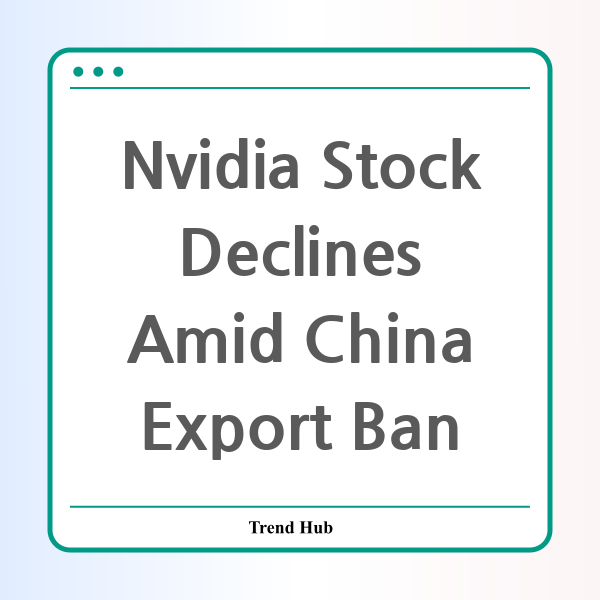* This website participates in the Amazon Affiliate Program and earns from qualifying purchases.

Is Nvidia's Stock Set for a Rollercoaster Ride?
Nvidia Corp, a leader in graphics processing units (GPUs) and artificial intelligence (AI) technologies, has recently caused ripples in the stock market with its alarming forecast on earnings. With a staggering $5.5 billion charge anticipated due to the U.S. government's export ban on its H20 chip for China, investors are left wondering how this will impact Nvidia's stock and the broader tech industry.
The restrictions imposed by the U.S. government require companies like Nvidia and AMD to obtain export licenses for certain AI chips, notably the NVIDIA H20 and AMD MI308. This development has not only prompted a drop in Nvidia's stock prices but has also affected AMD shares, highlighting the volatility that can stem from geopolitical dynamics.
The forecast of lower stock futures following Nvidia's warning illustrates the interconnectedness of global supply chains and market sentiment. At 7:58 a.m. ET, the Dow futures slipped by 0.02%, while the S&P 500 and tech-heavy NASDAQ futures fell by 0.65% and 1.27%, respectively. Analysts point to ongoing concerns over trade policies and tariffs as key factors driving this downward trend.
Investors are particularly uneasy about President Trump's erratic tariff policies, which have left many businesses withholding spending decisions. While there have been signs of potential exemptions for certain electronic goods, the certainty regarding tariffs remains undetermined, thereby increasing market volatility.
As the tech sector braces for potential fallout, all eyes will be on upcoming earnings reports from major corporations. United Airlines and J.B. Hunt Transport Services have recently reported better-than-expected earnings, in contrast to Interactive Brokers, who missed their forecasts. These reports will play a crucial role in shaping investor confidence moving forward.
The Broader Impact on the Economy:
The implications of Nvidia's challenges extend beyond the company's earnings. As retail sales data is projected to show a 1.2% increase for March, contrasting February's 0.2% increase, economists speculate on the broader consumer sentiment. Recent surveys have indicated a growing gloom regarding the economy and inflation, leading to concerns about spending behaviors.
Moreover, the uncertainty surrounding trade relations with China could potentially hinder innovation and growth in the tech industry. With firms like Nvidia and AMD at the forefront of AI development, any disruptive sanctions could slow down their advancements, which not only affects stocks but future technological progress.
Conclusion:
Nvidia's stock decline due to the export ban is a critical reminder of how geopolitics can directly influence market dynamics. As we move forward, the situation highlights the importance of keeping a close watch on government policies and their ramifications on the tech sector. Investors should remain cautious but also alert to the potential opportunities that may arise in the wake of this unpredictability. With more data on retail sales and earnings reports on the horizon, the coming weeks may reveal vital insights into market recovery or further declines.
* This website participates in the Amazon Affiliate Program and earns from qualifying purchases.